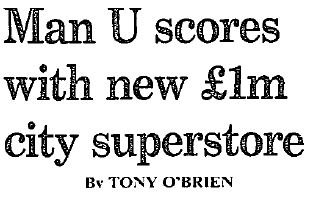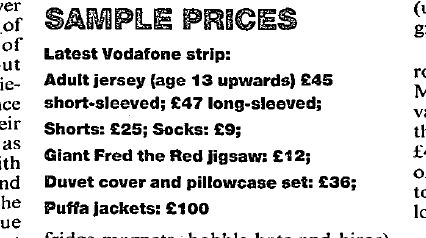Hard as it may be to imagine, there were more worrying times for League of Ireland fans than the present. As tough as the declining crowds and folding of clubs appear to a staunch and loyal fan base these days, events at the turn of the millennium really didn’t bode well for our League.
First came Wimbledon’s proposed move to Dublin, one which could well have destroyed the domestic league here. Thankfully, this fell through. Next, came the formation of Dublin City FC, a new team that threatened to usurp those fans that sit on the fence with regard which team they follow in Dublin, but make up the bumper gates on big match days; that didn’t go too well for them either. And thirdly, something which may seem insignificant, but Manchester United’s Superstore and Café on D’Olier Street really could have had a knock on effect as the fate of Ireland as a nation of barstool football fans may well have been sealed.
The premises, on the junction of Westmoreland Street didn’t come cheap, but the prime location and massive footfall that came along with that encouraged the club to splash out on a 25 year lease on the building, before investing a reported £1m in fitting out the store which was split over three floors – the ground and first being the store itself and the Red Cafe, a Manchester United themed cafe in which games would be streamed live, in the basement. (Games could be watched whilst munching on a Beckham Burger, with Man. Utd. Ketchup.) The building, then owned by Treasury Holdings would set them back €400, 000 a year. Their previous ventures on these shores, spurred by a pop-up shop opened by the legendary Bobby Charlton in Roche’s Stores on Henry Street were booming, so perhaps it seemed like a license to print money for the club. They were wrong.
The store opened quietly in August 2001, with its official opening not happening until mid October to a huge fanfare, with the bottom of O’Connell Street, D’Olier Street and Westmoreland Street shut off in expectation of crowds of up to 5, 000. The opening reportedly ran three times over budget, a bill footed by Roche’s Stores, who ran the Club’s five stores in the Republic. Roy Keane, Gary Neville and Mark Bosnich were in attendance, along with Sir Alex Ferguson himself.
Peter Kenyon, then the club’s Chief Executive said of the store:
Manchester United’s historic links with Ireland and the huge support that exists today presents a unique opportunity to bring the heart of the club closer to those supporters.

Sir Alex at the official opening of the store, October 2000. From the Irish Times.
To bring the club closer to the heart of their supporters indeed, and to empty their wallets of their hard earned cash. But despite all the fanfare, the shop never really took off. Extortionate prices, a soul-less store and less than friendly staff saw the place become a ghost town. Row upon row of replica kits, shelf upon shelf of pencil cases, books, quilt covers, key rings, bath towels, teddy bears, quilts and even cricket bats, gradually gathered dust.
The store shut, quietly, in February 2002, being in existence less than two years. But the debacle didn’t end there, as their lease still had another twenty two years to go; it still has another twelve or so years to go in fact, as Manchester United Commercial Enterprises (Ireland) Ltd. are still down as the lease holders on the building. The firm tried their hand at damage control, opening Redz Bar, home to the Dublin MUFC Supporters Club. This venture didn’t last long and was supplanted by the notorious Redz Nightclub, now closed. Their debts last year were a mere €200, 000 or so, down €2, 000, 000 from 2010, due in part to the building being sublet by a new group, Lafayette, who seem to be trading steadily. So there you have it. Man Utd, it seems, were signing flops long before Eric Djemba Djemba, and for the League of Ireland, perhaps thankfully so.



 Click on the book for more.
Click on the book for more. Click on the book for more.
Click on the book for more.
“The store opened quietly in August 2010…” Typo?
Sorted before I saw your comment! Cheers!
[…] a student Anti-Fascist meeting in 1934 attended by some well known characters, remembering the Manchester United Store on Westmoreland Street and probably my favourite bit, a look at where the term “Donnybrook Fair” comes […]